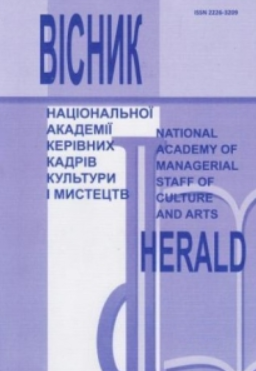SPIRITUAL ORIGINS OF THE ARIA GENRE AND THE SPECIFICITY OF ITS FORMATION IN THE COMPOSITE WORKS OF EUROPE AND CHINA
SPIRITUAL ORIGINS OF THE ARIA GENRE AND THE SPECIFICITY OF ITS FORMATION IN THE COMPOSITE WORKS OF EUROPE AND CHINA
Author(s): Sung ShangzhuiSubject(s): Theatre, Dance, Performing Arts, Cultural history, Music, Middle Ages, 16th Century, History of Art
Published by: Національна академія керівних кадрів культури і мистецтв
Keywords: spiritual origins of music; aria; temporal symmetry of events; genre in music; opera;
Summary/Abstract: The purpose of the article is to reveal common features in the interpretation of the genre of aria and its evolution in Europe and China from the Middle Ages to the beginning of Modern Times. The methodology is formed by music-cultural and intonational-stylistic analysis, as well as by a comparative style of styling. The scientific novelty is defined by revealing commonality in the development of certain phenomena in the development of the history of musical art of different countries, in particular, France and China due to the increased attention to the genre of the aria. Conclusions. The term "aria" in European music of this period meant three possible semantic nuances - "polite", "serious" and spiritual. Aria originated from the practice of French temple singing in the XII – XIII centuries, when high-frequency heterophony emphasized high and medium ("countertenor") voices and in which the free "rhetorical" development of the party was determined by the spiritual melody of the "tenor". In the future, the aria in the XVIIth century opera, according to the description, retained its connection with the old church singing tradition, which was subsequently abandoned. However, the genre of arias was actively used in the practice of the musical theater of China XV – XVI centuries (drama of Yuan, Kunqu), in which vocalization with its specific methods of sound production was generously filled with rhetoric of inventions and scenery, symbolizing the continuity of high traditions and church court lyrics in the era of national revival after liberation from the Mongol conquest. Aria is an important structural component of European and Chinese opera from the Middle Ages to the Modern Times. This historically defined this genre as the basic one for the representatives of the Far East, Tan Dun, and Yun Isang in their creative development of European composer technique and opera form.
Journal: Вісник Національної академії керівних кадрів культури і мистецтв
- Issue Year: 2020
- Issue No: 4
- Page Range: 191-196
- Page Count: 6
- Language: English

